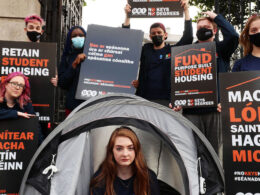As part of a genuinely free and accessible education system, from pre-primary to fourth level, the student grant system should be open to all students, regardless of means.
The opening of the pre-budget season has seen the return of veiled and not-so-veiled debate between the coalition partners in the pages of the newspapers. Fine Gael and Labour are going to great lengths to create the impression that they are fighting hard for ‘their’ constituencies. For Labour in particular, faced with a dramatic slide in support, this is a vital exercise. The next budget will be savage and Labour wants to position itself as having opposed and stopped the worst of the Fine Gael proposals to attack its working class voters.
So far, a focal point has been a debate over means-testing for student grants. While currently students are means-tested on the incomes of their parents, Labour has raised the idea of means-testing students on the assets of their parents. On this issue, Labour is attempting to pose as a defender of the interests of working class people, by pointing out the inequities of grant access for PAYE workers compared to the farmers and the self-employed. While it is true that the urban and rural self-employed have opportunities for tax avoidance and evasion that PAYE workers do not have, Labour’s TDs cannot be seen in any way as defenders of ordinary PAYE workers in this situation.
Instead, this debate is part of a softening-up exercise for further attacks on the student grant system and third level education generally and should be rejected by the left. It is also a way for Labour to attempt to completely forget its pre-election commitment not to increase fees or reduce grants. Both Labour and Fine Gael are committed to more attacks on education generally, including attacking access to education.
It is ironic that those who ridicule the proposals from the United Left Alliance for a wealth tax on the assets of the richest in our society should now suddenly become proponents for taking these assets into account. If Labour was serious about taxation justice and equality of access to education, it could argue for and demand a genuinely progressive taxation system. This would mean an end to the campaign of fear to try to force people to pay the regressive household tax, which is part and parcel of a project of imposing much larger property taxes and water charges and shifting the burden of taxation further away from those with high incomes, wealth and profits, towards working class people and small farmers. It could demand an increase in taxation on high incomes, an increase in corporation tax and targeting the assets of the rich with a wealth tax.
Instead, what we have here is simply an attempt to cover an attack on the grant system in progressive clothing. This is a tactic that has been used in the last years repeatedly – as with the rhetoric surrounding the property tax, the mooted attacks on child benefit as well as the discussion surrounding the idea of a re-introduction of full fees. The notion of universal access to child benefit or education is attacked by first taking examples of rich people who benefit from such universal access. This is the thin end of a wedge to delegitimise the idea of universality, which will end with the complete removal of the right of access to these services. The left and the student movement should not accept any attacks on the level of grants or the number of people entitled to them. We should defend access to child benefit and third level education, including grants, as a universal right. Those who are rich should pay for these services through progressive taxation.
However, we also should not accept being boxed in by this extremely limited debate. One of the most frustrating aspects of it is how young adults, potential students, are simply perceived as extensions of their parents. If their parents are less well-off, they may be entitled to grants. If their parents are better off, they won’t be entitled to grants. It doesn’t take into account the fact that the parents may refuse to support their children in pursuing third level education or a multitude of other family situations that can exist, whereby students cannot rely on the resources of their parents to support them through college.
The left should argue for students to be treated independently of their parents. As part of a genuinely free and accessible education system, from pre-primary to fourth level, not only should there be a scrapping of the supposed ‘capitation fee’, which at €2,250 is a serious obstacle to third level education for many, there should be the provision of a universal, decent student grant system. This would mean every young adult having a real choice about whether into go to third level education or not.
The right will of course sneer, and ask: Where will the money come from for this? How much would it cost to provide every student with a decent grant? Currently the government has budgeted €386m to pay for the 40% of students who qualify for grants. If this was increased to 100% of students, and the level of grant was kept at the same level, it would cost an extra €600 million. If the rate of grant was doubled at the same time, there would be an extra cost of €1.6 billion.
Is this a ridiculous demand in these crisis times? Only if you accept the ideological onslaught that says this country is now poor. The reality is that it isn’t. Ireland is still a wealthy country, but the political elite have chosen to protect the interests of those who own that wealth and the financial speculators who are owed by our failed banks.
On 1 October, another unsecured bond, worth €1 billion is to be paid off by the state-owned AIB – a cost that will be borne by the taxpayer. Refusing to pay that bond to speculators on the financial markets would more than pay for the extension of the grant to everybody and would part pay for the doubling of the grant. An emergency wealth tax of 5% on the richest 5% of the country would raise in the region of €10 billion. A capital tax of 25% on uninvested profits would raise around €8 billion. Not to mention nationalising Corrib gas, increasing corporation tax, increasing income tax on the highest earners, etc.
The examples are endless. The point is that it is not a question of arithmetic – it is a question of politics. The resources and wealth in our society exist for decent education, decent public services and a decent standard of living to be provided for all. That is not done, not because of the crisis, but because our society is currently run for the major corporations and the wealthy, rather than for the majority.
A rejuvenated student movement demanding genuinely free education and the means to access that education for all could play an important role in fighting for a fundamental change in how our society is run. Together with working people fighting in campaigns like the Campaign Against the Household and Water Taxes and trade unionists reclaiming the trade union movement from the bureaucrats at the top, a struggle could be developed in this country that links up with others across Europe in fighting for an end to austerity and for a decent, just, and socialist society.











